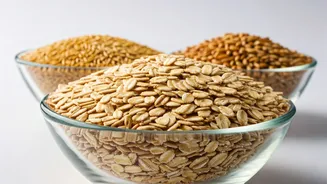The Indian Breakfast Battle
The Indian breakfast landscape is a vibrant mix of flavors and ingredients, with health-conscious individuals often torn between oats and dalia. Oats,
known for their versatility, have steadily gained popularity. Dalia, made from broken wheat, holds a special place in Indian cuisine, offering a familiar taste and texture. This article aims to settle the breakfast debate by examining the nutritional qualities and other key factors of both these common Indian breakfast staples, guiding the reader towards a choice that best suits their health goals and individual preferences.
Oats: A Nutritional Powerhouse
Oats have earned their reputation as a nutritional powerhouse. They are rich in soluble fiber, particularly beta-glucan, which is recognized for its ability to lower cholesterol levels and improve heart health. Oats are also packed with essential vitamins and minerals, including manganese, phosphorus, magnesium, and iron. Their high fiber content aids in digestion and helps to keep you feeling full for longer, making them a good option for weight management. Furthermore, oats are naturally gluten-free, although they can sometimes be cross-contaminated during processing; so, it is wise to be mindful of this when consuming them. This versatility makes oats a widely-favored breakfast choice, easily adapted to various tastes and dietary needs.
Dalia: The Traditional Choice
Dalia, or broken wheat, is a staple in many Indian households and offers a range of nutritional benefits. It is a good source of fiber, aiding in digestion and helping to regulate blood sugar levels. Dalia also provides essential nutrients like iron, magnesium, and B vitamins. Unlike some processed breakfast cereals, dalia retains more of its natural nutrients. Its lower glycemic index (GI) makes it suitable for individuals managing blood sugar levels. Moreover, dalia is often more affordable and readily available, making it an accessible breakfast option for many people across the country. The slightly nutty taste and versatility in cooking makes it a good option.
Fiber, GI, and Other Factors
Fiber content is an important consideration when choosing between oats and dalia. Oats are high in soluble fiber, which forms a gel-like substance that helps slow down the digestion of carbohydrates and the absorption of sugar. Dalia also contains a substantial amount of fiber, contributing to digestive health. The glycemic index (GI) is another important factor; Dalia usually has a lower GI compared to oats, meaning it causes a slower and more gradual rise in blood sugar levels after consumption. This makes dalia a better option for those with diabetes or who are trying to manage their blood sugar. The GI of both oats and dalia can vary slightly based on the processing method and the ingredients added during cooking.
Preparing Your Breakfast
The methods used to prepare oats and dalia can significantly impact their nutritional value and taste. Oats can be prepared in various ways: as porridge, in smoothies, or even added to baked goods. Cooking them with water or milk and adding fruits, nuts, or seeds can enhance their flavor and nutritional profile. Dalia can also be prepared as a porridge, but it is often cooked as a savory dish with vegetables, spices, and lentils. This method creates a filling and balanced meal. The cooking method, the types of ingredients used, and the level of processing each grain undergoes all play crucial roles in determining its nutritional impact.
Which Breakfast Wins?
The choice between oats and dalia ultimately depends on individual dietary needs and preferences. Oats, with their high fiber content and cholesterol-lowering properties, are an excellent choice for heart health and digestive well-being. Dalia, with its lower GI and familiar taste, is beneficial for those managing blood sugar and looking for a traditional breakfast option. The best approach is to consider your specific health goals, any dietary restrictions you may have, and what appeals most to your taste buds. Both oats and dalia offer valuable nutritional benefits and can contribute to a healthy and balanced diet when chosen according to the individual's needs.













